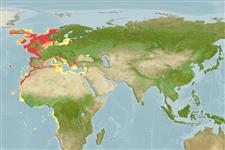Preferred temperature (Ref.
115969): 10.6 - 16.6, mean 13.3 (based on 165 cells).
Phylogenetic diversity index (Ref.
82804): PD
50 = 0.5001 [Uniqueness, from 0.5 = low to 2.0 = high].
Bayesian length-weight: a=0.00813 (0.00740 - 0.00893), b=2.95 (2.92 - 2.98), in cm Total Length, based on LWR estimates for this species (Ref.
93245).
Τροφικό Επίπεδο (Ref.
69278): 3.7 ±0.0 se; based on diet studies.
Ελαστικότητα (Ref.
120179): Μεσαίο(α), ελάχιστος χρόνος για διπλασιασμό πληθυσμού 1,4 - 4,4 έτη (K=0.12-0.16; tm=2-4; tmax=11; Fec=70,000).
Prior r = 0.39, 95% CL = 0.26 - 0.58, Based on 13 full stock assessments.
Fishing Vulnerability (Ref.
59153): High vulnerability (56 of 100).
Climate Vulnerability (Ref.
125649): Low vulnerability (25 of 100).
